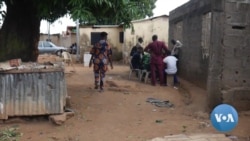Escalating insecurity and communal violence in Nigeria appear to be strengthening separatist movements across the country. Among those movements is the Indigenous People of Biafra, a group that advocates an independent state in a part of Nigeria that tried to break away more than 50 years ago.
On a typical Sunday evening, 73-year-old former Biafran fighter Ideyi Obasi sits in front of his shanty home in a low-income housing area of Abuja and sniffs his snuff.
He's grown popular in his area for often talking about his experience fighting the Biafran War in the late 1960s.
He said he has renewed hope for an independent Biafra.
"We used to stay two weeks without food. The only thing they'll give you is ogogoro (dry gin). You'll carry your kits and come out with your water bottle. They'll fill it up with ogogoro, you go there to fight. If you die, it's nobody's business," said Obasi.
Obasi was only 20 years old in 1967 when the civil war started and he got recruited.
The war lasted three years, and the Biafran movement was defeated. He says many of his friends were killed fighting the Nigerian state, but he somehow survived.
Today, he still supports secession, but said fighting must be avoided.
"Don't fight another war, because children will be finished. If they can do it amicably and peacefully,” he said.
In January, the separatist group, Indigenous People of Biafra, or IPOB, launched an armed security unit. The aim was to push back on Fulani herders, who are often blamed for communal clashes in the region.
But Nigerian authorities consider the unit as subversive. Troops have cracked down on the armed group in states where it is active.
In 2017, the government banned IPOB’s activities, which are led by British Nigerian activist Nnamdi Kanu.
Some Nigerian political analysts such as Jibrin Ibrahim say IPOB’s demands for independence are unlikely to succeed.
"It's legitimate for them to make demands for separation. But the reality on the ground is that it's difficult for Nigeria to separate. We've been together for over a century. We have intermarried significantly. We have migrated extensively," he said.
In recent months, a Yoruba separatist group has appeared, calling for the creation of an independent state known as the Oduduwa Republic. The republic would include the southwestern parts of the country, including Nigeria’s economic capital, Lagos.
Ibrahim said besides the insecurity, political marginalization is to blame for the rise of these separatist movements.
"A lot of Nigerians are very dissatisfied with the political community we have. They feel it is not structured to serve their interests. They feel there's significant levels of marginalization that makes their citizenship ineffective," he said.
Experts predict agitation by these movements will likely increase as the country heads toward elections in 2023. But they say the Nigerian government is unlikely to cede any power to the separatists — and a conflict will be too dangerous to pursue.





